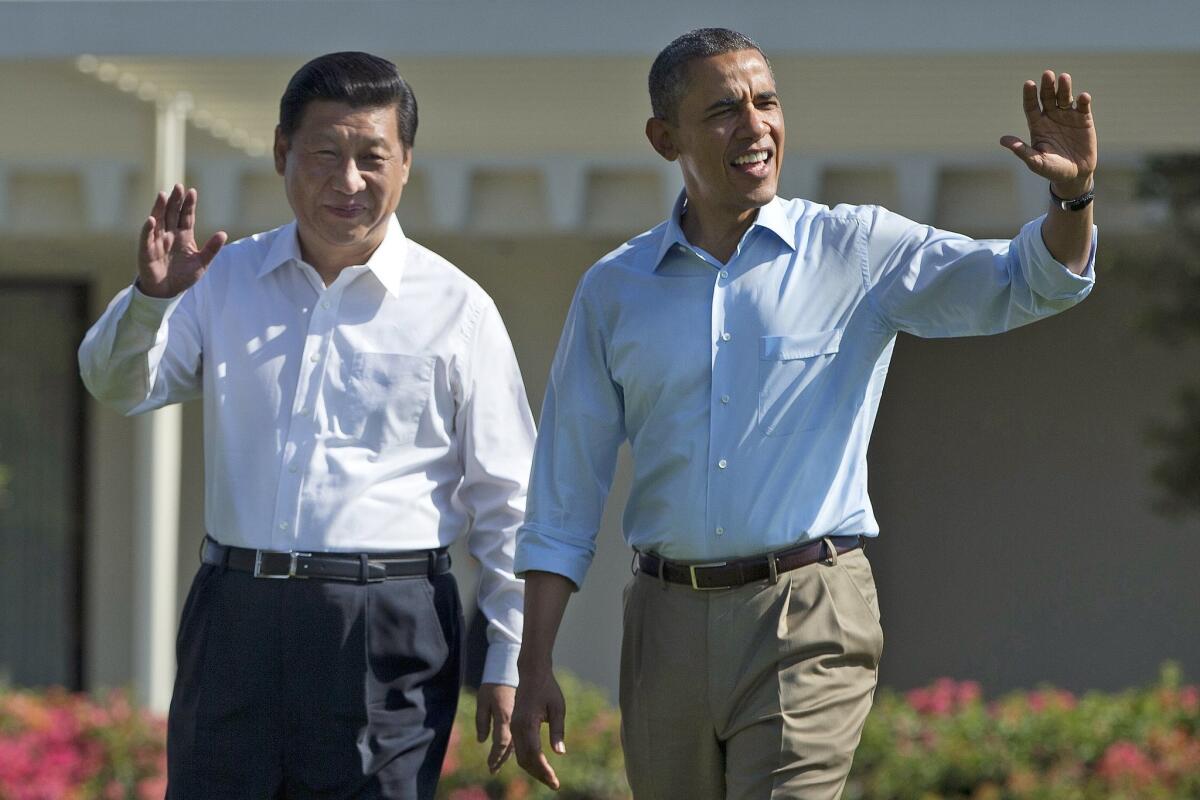Editorial: Will American CEOs cave to China’s president?

Chinese President Xi Jinping and President Obama walk together at the Annenberg Retreat of the Sunnylands estate in Rancho Mirage, Calif. on June 8, 2013.
- Share via
Pope Francis isn’t the only high-profile international figure arriving in the United States this week. Chinese President Xi Jinping is due in Seattle on Tuesday before heading east for an official White House visit. He and President Obama will have much to discuss, including economics, trade, human rights and China’s territorial ambitions. But 30 U.S. business leaders will meet with Xi in Seattle first, and it’s important that they not undermine their long-term interests by giving Xi the wrong message on cybersecurity.
The visit is Xi’s first since becoming China’s head of state in 2013, and analysts say he’s determined that China be seen as this country’s equal. To many U.S. chief executives, though, China seems the more attractive market: Its economy is growing considerably faster, the population is much bigger and incomes are rising as a middle class emerges.
The CEOs may see the meeting as an opportunity to press for greater access to the Chinese market, which would be helpful for all U.S. firms. So would pushing China to provide more protection for intellectual property. But Xi no doubt wants something in return.
According to the Wall Street Journal, analysts expect Xi to ask the CEOs to lobby the Obama administration to not impose economic sanctions on China as punishment for cyber attacks, including the theft of millions of sensitive personnel records from U.S. government computers. Chinese officials have denied any state involvement in online crime, but cybersecurity experts say there’s strong evidence tying the Chinese military and other government agencies to a raft of attacks. Nevertheless, the Obama administration has been reluctant to do anything in response.
Chinese officials also point out (with some relish) that many of the world’s hacking incidents can be traced to computers in the United States. And as Edward Snowden revealed, the U.S. government secretly gathers information online on an epic scale. The crucial difference, though, is that government agencies here do not, and should not, engage in the sort of industrial espionage that analysts say the Chinese government does routinely, such as the theft of trade secrets.
The business leaders fortunate enough to get an audience with Xi can’t be faulted if they spend the time pushing their short-term objectives. And given that economic sanctions against China could bite into U.S. companies’ sales, some CEOs may be tempted to side with Xi if he asks for help opposing them. But it would be shortsighted and foolish to try to dampen the federal government’s response to the relentless cyber attacks. Imposing sanctions may not stop the hacking, but it would be an overdue step forward from the current policy, which is to do nothing.
Follow the Opinion section on Twitter @latimesopinion and Facebook
More to Read
A cure for the common opinion
Get thought-provoking perspectives with our weekly newsletter.
You may occasionally receive promotional content from the Los Angeles Times.









